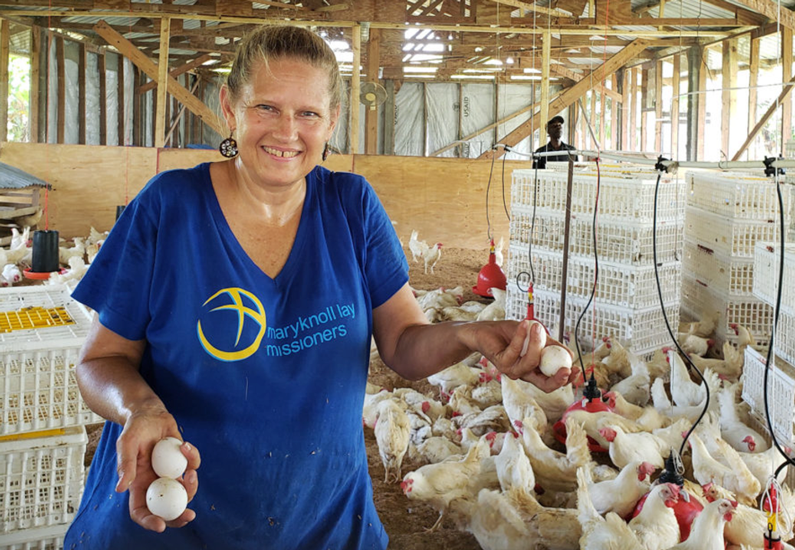Maryknoll Lay Missioner Sami Scott describes ongoing violence in Haiti and calls for a moratorium on weapons sales to the embattled country.
By Marietha Góngora V.
Suzanne “Sami” Scott, the first Maryknoll lay missioner assigned to Haiti, says she witnessed the Caribbean island nation’s descent into social and political crisis from the time she arrived in 2018 until she had to leave in March 2024 due to escalating gang violence.
Since the beginning of her mission in the northern city of Gros Morne, Scott had witnessed the country’s growing social crisis. Haiti was still reeling from the humanitarian emergency provoked by the 2010 earthquake that claimed an estimated 220,000 lives. In recent years the situation worsened with growing violence, insecurity and political and economic instability.
Scott, who joined the Maryknoll Lay Missioners in 1996 and served in various mission ministries in Venezuela and Cambodia before going to Haiti, says one of the many causes for the crisis is government corruption. She cites the example of PetroCaribe, a program created by the late Venezuelan President Hugo Chavez to provide Caribbean countries with gasoline at a reduced price. The idea was that governments of those countries could then use the money they saved on gasoline to help develop the country.
“A lot of the money from PetroCaribe in Haiti was used for personal development as opposed to community development,” Scott says. “From 2018, 2019, and 2020 until COVID, there was a lot of civil unrest trying to topple the government about the PetroCaribe money.”
A presidential assassination and kidnappings
During the pandemic, she says, “things were kind of calm, because there was not a lot of movement within the country.” Turmoil resumed with the assassination of then President Jovenel Moïse in 2021.
The kidnapping of 17 missionaries from the United States and Canada by a gang that same year exacerbated the already critical social situation. The widely publicized kidnapping was a precursor of the intensified gang violence the country was about to face.
Gangs finance themselves through kidnapping and extortion in order to buy weapons and ammunition, Scott says. She adds that people are forced to pay extortion fees ” in order to keep commerce going, especially out of Port-au-Prince, where the main port is and where the gasoline terminals are. Truck drivers, bus drivers, anybody engaged in transporting commerce is paying a pretty penny to move through.”
An aggravating factor, Scott explains, is that the country’s banks are running out of money. “There just is no liquid cash, and the banks can’t replenish their supply because of the insecurity,” she says.
Scott says that the Haitian government had shown signs of collapse for a long time and that the Haitian people have lost faith in governmental institutions to help them. “There were elections that were supposed to happen in 2018 that never happened, nor in 2019, so there no longer are any elected officials in the country,” she says, adding that people “see no benefit from the government — they just see politicians are in it for themselves.”

Maryknoll Lay Missioner Suzanne “Sami” Scott, who was assigned to serve in Haiti in 2018, collects eggs at the Hen House Project she helped run in the northern town of Gros Morne. The missioner had to leave in March of 2024 due to violence but says she hopes to return there once the country is stabilized. (Vivian Niestrom/Haiti)
The country’s deterioration has spread to all institutions and parts of society, the missioner says. This situation is compounded by unemployment and the depletion of agricultural land. Because of erosion, “the farms aren’t producing that much; what they produce are rocks,” she says. “There aren’t jobs.”
As a result, gangs become a way to survive the dire situation for many, especially the young, she says.
“Men in particular have nothing to do, and they’re the ones recruited into the gangs,” Scott says. “There’s a huge percentage of the gangs right now who are youth, minors. The gangs give them something. You get money, you get food, you get a sense of belonging.”
For this lay missioner, who in her ministry in Haiti supported a hen house project that provided fresh eggs to the merchants of Gros Morne, one key to resolving the crisis is to “stop the flow of arms, especially the ammunition, coming from the U.S.”
“Without security, you can’t have anything else,” Scott says. You can’t have the free flow of commerce and goods and services. You can’t have free and fair elections. You can’t do any reconciliation. You can’t do job training. You can’t have education.”
As a missioner who served previously in places of conflict and still hopes to return to Haiti when the situation improves, Scott recognizes the importance of inclusion, forgiveness and reconciliation in building long-lasting peace.
“The gang members need to be included in whatever solution there is because they’re finding something in the gangs that they’re not finding in their life,” she says. “You can’t just kill them all and say, ‘well, too bad, because they deserve to die.’ “
Featured Image: A man and child take cover from gunfire near the National Palace in Port-au-Prince, Haiti, March 21, 2024. (OSV New photo/Ralph Tedy Erol, Reuters)

